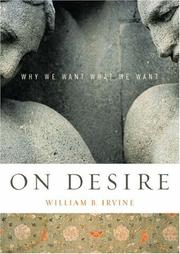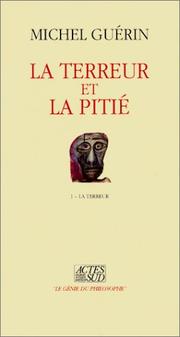| Listing 1 - 10 of 13 | << page >> |
Sort by
|

ISBN: 1280845910 0195345975 1429438088 9780195345971 9780195188622 0195188624 9780195327076 0195327071 9781280845918 9781429438087 0199839085 Year: 2006 Publisher: Oxford ; New York : Oxford University Press,
Abstract | Keywords | Export | Availability | Bookmark
 Loading...
Loading...Choose an application
- Reference Manager
- EndNote
- RefWorks (Direct export to RefWorks)
Presents a study of the phenomenon of desire: how it controls us, how we seek to control it; what wisdom has been offered on the subject by philosophy, religion and science over the ages. This book brings together a range of religious advice on mastering desire, from the Buddhist middle path to the promise of a Christian or Islamic afterlife.
Book
ISBN: 2267001136 9782267001136 Year: 1978 Publisher: Paris : C. Bourgois,
Abstract | Keywords | Export | Availability | Bookmark
 Loading...
Loading...Choose an application
- Reference Manager
- EndNote
- RefWorks (Direct export to RefWorks)
Psychiatry --- Psychanalyse. --- Desire --- Hate --- 159.942 --- #SBIB:309H505 --- Hatred --- Aversion --- Appetency --- Longing --- Emotions --- Emoties algemeen --- Code en boodschap: psychologische, psycho-analytische benadering --- 159.942 Emoties algemeen --- Craving --- Yearning
Book
ISBN: 9780199576906 Year: 2009 Publisher: Oxford Oxford university press
Abstract | Keywords | Export | Availability | Bookmark
 Loading...
Loading...Choose an application
- Reference Manager
- EndNote
- RefWorks (Direct export to RefWorks)
Philosophical anthropology --- Affective and dynamic functions --- General ethics --- Desire --- Values --- Axiology --- Worth --- Aesthetics --- Knowledge, Theory of --- Metaphysics --- Psychology --- Ethics --- Appetency --- Craving --- Longing --- Yearning --- Emotions

ISBN: 2868694950 9782868694959 Year: 1990 Publisher: Arles : Labor,
Abstract | Keywords | Export | Availability | Bookmark
 Loading...
Loading...Choose an application
- Reference Manager
- EndNote
- RefWorks (Direct export to RefWorks)
Philosophy and psychology of culture --- Philosophy, French --- Philosophie française --- Emotions in literature --- Theater --- Desire --- Emotions (Philosophy) --- Terror --- Sympathy --- Psychological aspects --- -Dramatics --- Histrionics --- Professional theater --- Stage --- Theatre --- Performing arts --- Acting --- Actors --- Appetency --- Longing --- Emotions --- Pity --- Conduct of life --- Appeal to pity (Logical fallacy) --- Fear --- Terrorism --- Philosophy --- -Psychological aspects --- -Appetency --- Dramatics --- Philosophie française --- Craving --- Yearning --- Theater - Psychological aspects
Book
ISBN: 9023235053 Year: 2001 Publisher: Assen Van Gorcum
Abstract | Keywords | Export | Availability | Bookmark
 Loading...
Loading...Choose an application
- Reference Manager
- EndNote
- RefWorks (Direct export to RefWorks)
Philosophical anthropology --- Affective and dynamic functions --- Desire --- Desire (Philosophy) --- Psychology, Pathological --- Abnormal psychology --- Diseases, Mental --- Mental diseases --- Mental disorders --- Pathological psychology --- Psychology, Abnormal --- Psychopathology --- Neurology --- Brain --- Criminal psychology --- Mental health --- Psychiatry --- Psychoanalysis --- Philosophy --- Appetency --- Longing --- Emotions --- Diseases --- Craving --- Yearning
Book
ISBN: 9052403716 Year: 1997 Publisher: Antwerpen Baarn Hadewijch
Abstract | Keywords | Export | Availability | Bookmark
 Loading...
Loading...Choose an application
- Reference Manager
- EndNote
- RefWorks (Direct export to RefWorks)
In De extasen van Eros analyseert Stefan Beyst theorie en praktijk van de mannelijke en vrouwelijke polygamie, van promiscuïteit, het leven in de commune, ascese en verliefdheid, orgie en incest. Hij komt tot de merkwaardige conclusie dat de mens van nature levenslang monogaam zou zijn als de maatschappij de realisering van dat verlangen niet in de weg zou staan. Misschien zijn mannen én vrouwen polygaam. Misschien willen beide geslachten niets liever dan telkens weer nieuwe seksuele ervaringen met telkens nieuwe partners. Misschien zijn alle samenlevingsvormen enkel verminkte manieren om dionysisch op te gaan in één groot seksueel feest, de orgie. Is het mogelijik dat we van nature incestueuze neigingen hebben, en dat daarom onze relaties met niet-familieleden doorgaans op de klippen lopen? Of is seksualiteit een hinderlijke erfenis uit een animaal verleden, die we moeten overstijgen via het celibaat of ascese, zoals tallloze oude wijzen overal en in alle tijden voorhouden?
Ethnology. Cultural anthropology --- Affective and dynamic functions --- Seksuologie --- Sexologie --- Desire --- Love --- Lust --- Sex --- Gender (Sex) --- Human beings --- Human sexuality --- Sex (Gender) --- Sexual behavior --- Sexual practices --- Sexuality --- Sexology --- Carnal desire --- Concupiscence --- Lasciviousness --- Lechery --- Licentiousness --- Sexual lust --- Sexual excitement --- Affection --- Emotions --- First loves --- Friendship --- Intimacy (Psychology) --- Appetency --- Longing --- Craving --- Yearning
Book
ISBN: 0801843855 Year: 1992 Publisher: Baltimore Johns Hopkins university press
Abstract | Keywords | Export | Availability | Bookmark
 Loading...
Loading...Choose an application
- Reference Manager
- EndNote
- RefWorks (Direct export to RefWorks)
Philosophy and psychology of culture --- Girard, René --- 1 GIRARD, RENE --- Desire --- -Imitation --- Mimicry --- Influence (Psychology) --- Social influence --- Appetency --- Longing --- Emotions --- Filosofie. Psychologie--GIRARD, RENE --- Social aspects --- Girard, Rene --- Desire. --- Imitation. --- Social aspects. --- 1 GIRARD, RENE Filosofie. Psychologie--GIRARD, RENE --- Imitation --- Girard, René, --- Craving --- Yearning
Book
ISBN: 2246007615 9782246007616 Year: 1979 Publisher: Paris Grasset
Abstract | Keywords | Export | Availability | Bookmark
 Loading...
Loading...Choose an application
- Reference Manager
- EndNote
- RefWorks (Direct export to RefWorks)
Philosophical anthropology --- Christianity and culture --- Desire --- Hope --- Man (Christian theology) --- Religious aspects --- Christianity --- #GGSB: Filosofie --- #GGSB: Christendom --- -Man (Christian theology) --- #GROL:SEMI-316.7 --- Emotions --- Appetency --- Longing --- Contextualization (Christian theology) --- Culture and Christianity --- Inculturation (Christian theology) --- Indigenization (Christian theology) --- Culture --- -Christianity --- Christianisme --- Espoir --- Philosophie et religion --- Theological anthropology --- Craving --- Yearning --- Religious aspects&delete& --- Christendom --- Filosofie --- Hope, Theology of --- Hope (Theology) --- Theological virtues --- Hope - Religious aspects - Christianity
Book
ISBN: 9780415775182 9780415775175 0415775183 0415775175 Year: 2008 Publisher: New York : Routledge,
Abstract | Keywords | Export | Availability | Bookmark
 Loading...
Loading...Choose an application
- Reference Manager
- EndNote
- RefWorks (Direct export to RefWorks)
Desire: A History of European Sexuality is a sweeping survey of sexuality in Europe from the Greeks to the present day. It traces two concepts of sexual desire that have competed in European history: desire as dangerous, polluting, and disorderly; and desire as creative, transcendent, even revolutionary. This book follows these changing attitudes toward sexuality through the major turning points of European history. The book ends by demonstrating that western European sexual culture is quite distinct from many other cultures, as the Christian hostility to sexual desire has lost influence. At the same time, the vision of sexual desire as revolutionary seems to have faded. Written in a lively and engaging style the book contains many fascinating anecdotes drawing on a rich array of sources including poetry, novels, pornography and film as well as court records, autobiographies and personal letters. While Anna Clark builds on the work of dozens of historians, she also takes a fresh approach and introduces the concepts of twilight moments and sexual economies. Desire integrates the history of heterosexuality with same-sex desire, and focuses on the emotions of love as well as the passions of lust, the politics of sex as well as the personal experiences.
Sex --- Sex customs --- Desire --- Sexualité --- Vie sexuelle --- Désir --- History. --- Social aspects. --- Histoire --- Aspect social --- History --- Social aspects --- Sexualité --- Désir --- History of Europe --- History of civilization --- Gender (Sex) --- Human beings --- Human sexuality --- Sex (Gender) --- Sexual behavior --- Sexual practices --- Sexuality --- Sexology --- Customs, Sex --- Manners and customs --- Moral conditions --- Appetency --- Longing --- Emotions --- Craving --- Yearning --- Sex - Europe - History --- Sex customs - Europe - History --- Desire - Social aspects --- Norms --- Government --- Religion --- Attitudes --- Book --- Culture
Book
ISBN: 9781788739160 1788739167 9781788739184 9781788739191 Year: 2021 Publisher: London, UK : Verso,
Abstract | Keywords | Export | Availability | Bookmark
 Loading...
Loading...Choose an application
- Reference Manager
- EndNote
- RefWorks (Direct export to RefWorks)
A provocative, elegantly written analysis of female desire, consent, and sexuality in the age of MeToo Women are in a bind. They are told that in the name of sexual consent and feminist empowerment, they must proclaim their desires clearly and confidently. Sex researchers tell us that women don't know what they want. And men are on hand to persuade women that what they want is, in fact, exactly what men want. In this environment, how can women possibly know what they want--and how can they be expected to? In this elegantly written, searching book Katherine Angel surveys medical and psychoanalytic understandings of female desire, from Freud to Kinsey to present-day science; MeToo-era debates over consent, assault, and feminism; and popular culture, TV, and film to challenge our assumptions about female desire. Why, she asks, do we expect desire to be easily understood? Why is there not space for the unsure, the tentative, the maybe, the let's just see? In contrast to the endless exhortation to know what we want, Angel proposes that sex can be a conversation, requiring insight, interaction, and mutual vulnerability--a shared collaboration into the unknown. In this crucial moment of renewed attention to violence and power, Angel urges that we remake our thinking about sex, pleasure, and autonomy without any illusions of perfect self-knowledge. Only then will we bring about Michel Foucault's sardonic promise, in 1976, that tomorrow sex will be good again.
Women --- Sexual consent --- Desire --- MeToo movement --- #MeToo movement --- Me Too movement --- Social movements --- Appetency --- Craving --- Longing --- Yearning --- Emotions --- Consent (Law) --- Sexual ethics --- Female sexuality --- Sexual behavior --- Law and legislation --- #SBIB:613.88h43 --- #SBIB:316.346h29 --- #SBIB:613.88H43 --- #SBIB:316.346H29 --- Seksualiteit en volwassen vrouwen --- Positie van de vrouw in de samenleving: andere topics --- SOCIAL SCIENCE / Sociology / General. --- Sociology of the family. Sociology of sexuality --- Sexology --- Feminism --- Literature --- Power --- Popular culture --- Pornography --- Sexuality --- Sexually transgressive behavior --- Book
| Listing 1 - 10 of 13 | << page >> |
Sort by
|

 Search
Search Feedback
Feedback About
About Help
Help News
News